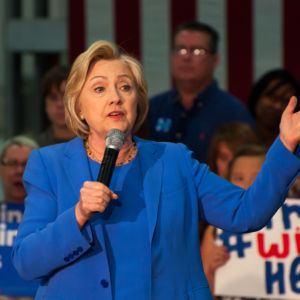One jarring note in Hillary Clinton’s acceptance speech at the Democratic National Convention was her statement that she would press for a constitutional amendment to overturn Citizens United v. Federal Elections Commission. This 2009 Supreme Court case held that corporations had the same rights as individuals to make statements for or against the election of a candidate for public office. Particularly difficult to understand was her linking Citizens United to the fact that our economy is not functioning well for many Americans.
Taking the last point first, what could be the link between Citizens United and a poorly functioning economy? It’s likely that Ms. Clinton wanted her listeners to infer that corporate power, expressed through independent expenditures—presumably contributions to superpacs or other hidden sources—had distorted the public’s will for the benefit of powerful private parties.
This is a peculiar claim to make after almost eight years of the Obama presidency, in which the most significant government actions—the Dodd-Frank Act, ObamaCare, and various tax increases on corporations and wealthy individuals—could hardly be said to favor corporations or business interests generally. It is also peculiar in light of a recent Wall Street Journal report that hedge fund contributions to Clinton superpacs have outraised those to Trump superpacs by a ratio of more than 2000-to-1 ($46.5 million to $19,000).
But leaving aside these anomalies, what is it about Citizens United that has stirred Ms. Clinton to propose something as drastic as a constitutional amendment, especially one affecting the First Amendment’s right to free speech?
Many of Ms. Clinton’s listeners who cheered her idea probably believe that their right to free speech would not be affected by overturning Citizens United. Of course, the language of the amendment would be determinative, but let’s assume it is as simple as adding new language at the end of the First Amendment as it now reads. Thus, the current language “Congress shall make no law abridging the freedom of speech,” would be supplemented by “except that corporations are prohibited from making political contributions or supporting or opposing any candidate for elective office.”
The New York Times is a corporation, so this language would prohibit the Times from editorializing in favor of or against either Ms. Clinton or Donald Trump. Moreover, it might shut down blogs, or firms like Facebook or Twitter, that are corporate vehicles for the expression of opinions about candidates by others. Clearly, closing down newspapers that publish editorials wouldn’t be satisfactory to many Americans, and if extended to other corporate opinion forums would be highly unpopular among the American people. How, then, could the language be modified to allow the New York Times and other corporations to express their views and still overturn Citizens United?
One way would be to make an exception for media corporations. Such an exception would clearly exempt the Times, but it would also exempt Citizens United, which was simply a corporation that made and distributed a film critical of Ms. Clinton in 2008—in other words, a media corporation by anyone’s definition.
What is a media corporation, anyway? If an oil company made and circulated a film in support of fracking, or set up a blog on which people could debate energy policies, would it then be a media corporation? If so, it would be easy to escape the new amendment, and nothing would be accomplished by making an exception for media corporations.
Another way to narrow the scope of a constitutional amendment so that it didn’t cover corporations like the New York Times would be to invoke the idea of balance. At one time, on the theory that the airwaves were a limited, government-licensed resource, the FCC required that all political statements for and against candidates over radio or TV had to be balanced. If a station allowed one candidate to speak, then an opposing candidate was required to get “equal time.” Another idea was the so-called “Fairness Doctrine” which required both sides of a major public issue to be presented if one side was covered.
It is questionable whether implementing such a rule is feasible in today’s world. How would newspapers, magazines, and a zillion blogs have covered all 17 Republican candidates in this year’s primary period? And requiring the Times and others to provide a “fair” appraisal of all four presidential candidates on its editorial pages would be a considerable burden. One of the reasons equal time and the Fairness Doctrine were abandoned during the 1980s was that, to avoid the expense involved, radio and TV stations simply avoided candidate interviews or controversial issues.
So how would a constitutional amendment that would overturn Citizens United actually work? Given the importance of the idea, and the fact that it has been advanced by a person who could be president, it would be fair to ask Ms Clinton to be more explicit during the coming campaign about her plan for a constitutional amendment.

